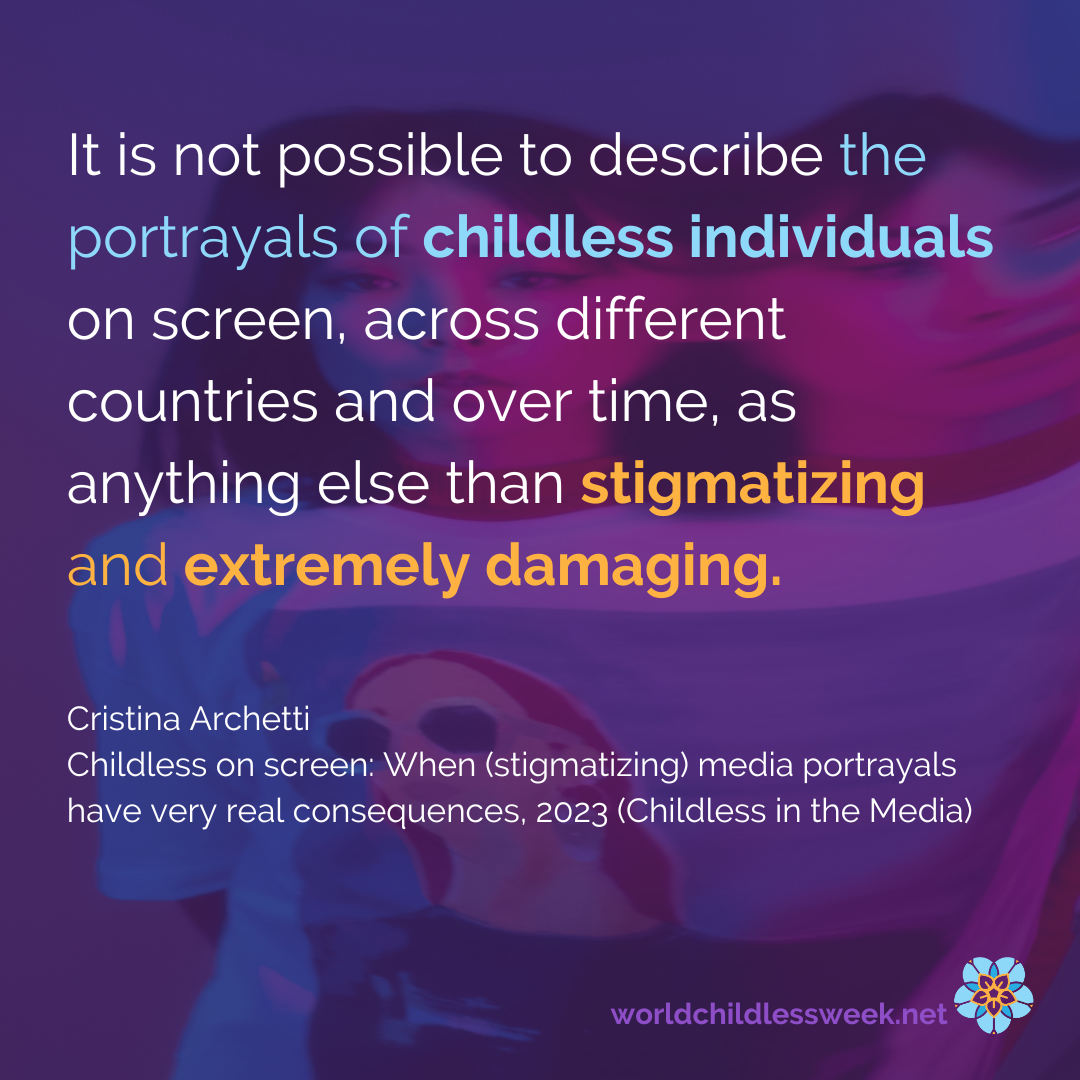Cristina Archetti
This piece makes the point that the way the media portray childless individuals matters beyond the screen, to the way we live our lives. It is based on a study I conducted of the representations of women and men who are childless not be choice in film.I analyzed 50 movies produced in the timeframe 1949 to 2017in the US, Italy and Norway (you can read the full study here).
Where it started
“Why are all childless women in outer space?” This was the question that popped into my mind years ago, in a state of jetlagged drowsiness, during a transatlantic flight. I had just finished watching Gravity (2013), a film about the struggle for survival of an astronaut who was, as it suddenly occurred to me, a childless woman. Was this not a similar story to the one I had not long before seen unfolding in Prometheus (2012)?The female lead character therewas also childless. Which other films had childless characters in them? As hard as I tried, at that moment, I could not find other examples. How was that possible?
Back then I was researching the silence surrounding involuntary childlessness and I knew as a fact that practically close to a quarter of the adult population of Western societies—we are talking about millions and millions of people—is childless not by choice. Why are we nowhere to be seen, when we are so many? I decided I was going to investigate whether childless individuals figured in cinema and, if so, how they were portrayed.
It turns out there are indeed relatively few films where childless characters have a significant role in the story. Where they do, their representations are problematic to say the least. Here are some of my findings in a nutshell.
Troubling portrayals
It is not possible to describe the portrayals of childless individuals on screen, across different countries and over time, as anything else than stigmatizing and extremely damaging.
The childless characters either die, mostly because they commit suicide (especially in Norwegian storylines, as in Limbo, 2010) or are killed (for instance inThe Hand that Rocks the Cradle, 1992). If they don’t die, it is because they become “normal” by acquiring a baby, often against all odds (in Raising Arizona, 1987, by kidnapping a child), or by adopting (While We’re Young, 2014). The only childless individuals who manage, without a child, to get on with life, are female superheroes (Wonder Woman, 2017; the character of Black Widow [Scarlett Johansson] in The Avengers: Age of Ultron, 2015), female astronauts (the main characters in Prometheus, 2012 and Gravity, 2013), or men (Up in the Air, 2009; La Grande Bellezza[The Great Beauty], 2013). This implicitly points at the fact that, while for men it tends to be socially acceptable to be childless, for a woman it seldom is unless she is devoting herself to a higher cause for the sake of the entire humanity (no less!). In fact, ordinary women without children, within the plots I have analyzed, have no reason to live—compare Vanessa (Angelina Jolie) in By the Sea (2015) to Jep Gambardella (Toni Servillo) in The Great Beauty (2013).
Childless individuals, on top of this are weird, cold, neurotic and hysterical at best (Who is Afraid of Virginia Woolf, 1966; While We are Young, 2014), out to destroy other people’s lives at worst (the Queen [Salma Hayek] in Il raccontodeiracconti [Tale of Tales], 2015; Ravenna [Charlize Theron] in The Huntsman: Winter’s War, 2016). Their terminator-like destructive fury (Fatal Attraction, 1987; The Hand the Rocks the Cradle, 1992) is often the reason why no other choice is left but to kill them to defend oneself (and the nuclear family) from their evil.
Childless characters in the films I examined tend to lead a disordered life. A reason for this, as the plots suggest, is that childless individuals are not able to take care of themselves because they are not “real” adults. The tagline of Young Adult (2011), underlining this point, is ‘[e]veryone gets older, not everyone grows up.’ Corinna (Naomi Watts) and Josh (Ben Stiller) in While We’re Young(2014) become “finally” adult, after having spent most of the story with a younger couple in their 20s, by taking the decision to adopt.
Women, in the films I have analyzed, are so affected by the inability to bear a child that their characters tend, as a result, to show extreme signs of stress and even develop mental illness. An illustration is provided by Gemma, the tormented character played by Penelope Cruz in Venuto al mondo (Twice Born,2012). In addition to this, there seems to be a suggestion that their frustrated urge to procreate leads them to be sexually out of control. Vanessa (Angelina Jolie), for instance, tries to seduce a younger man in By the Sea (2015).
Beyond the negative stereotypes, the problems with these representations are that a life without children is never an option and that a woman who is not barren can always get pregnant, and mostly at first attempt—see Maggie’s Plan (2015). In fact, childlessness appears as a “temporary” condition until it gets “solved.” Childlessness by circumstance does not exist. Miracle babies are the norm.
I had expected Norwegian movies to show more open-mindedness towards childless women, out of a tradition of gender equality. I expected that Italian movies, especially from the past, would be more conservative, along the line of a longer history of patriarchy and a Catholic culture. Instead, I found Norwegian films, even contemporary ones, to be strongly stereotypical. Italian movies from the 1980s onwards, in fact, are considerably more daring in portraying characters that challenge the norm. Several films, for instance, deal with male infertility, an issue that is never squarely addressed elsewhere. Viaggio Sola (A Five Star Life, 2003) was the Italian film in which, most clearly within all the movies I examined, a childless adult woman protagonist, Irene (Margherita Buy), was neither portrayed like a figure of ridicule nor pitied: she was respected.
Why representations of childlessness in the media matter
These findings raise important questions about the long-term, subtle, yet very real, effects of media representations on the identity and well-being of the involuntarily childless: How can we expect our voices to be heard and our experiences to be acknowledged and respected when all the “majority” sees on the screen is stigmatizing stereotypes? What does it do to ourselves, when we cannot see, practically anywhere,our real experiences represented, let alone a dignified image of ourselves?
What we see on screen, in fact, even when fictional, is never “only” fiction. Nor it is without consequence. It is well known that the way female characters are portrayed in movies can affect our attitudes, mindset, and actual behaviour in relation to gender equality. To the point that Swedish cinemas introduced in 2013 an “A rating” for movies that satisfied the “Bechdel-Wallacetest”’s criteria (A-list Film 2018). To pass the test, a work of fiction must feature: a) at least two named women, b) who talk to each other, c) about a subject other than a man. The introduction of this test has not only inspired discussion about diversity. Within three years of its launch the amount of Swedish films that qualified for A rating also went from 30% to 80% (Women and Hollywood 2016).
Responding to the results of the analysis, and in the same provocative spirit of that test, I would like to offer a practical suggestion to sensitize film makers and audiences to the perspective of the childless not by choice community: some criteria to refer to in order to ensure the representation of individuals without children is not gratuitously stigmatizing. To pass it, a film should portray a childless character:
a) whose life is not meaningless;
b) who is not trying to acquire a child at all costs; and
c) who dedicates herself/himself to other activities than ruining other people’s lives.
Can you think of any film/series/novel that satisfies this test?
Photo by cottonbro studio from Pexels


